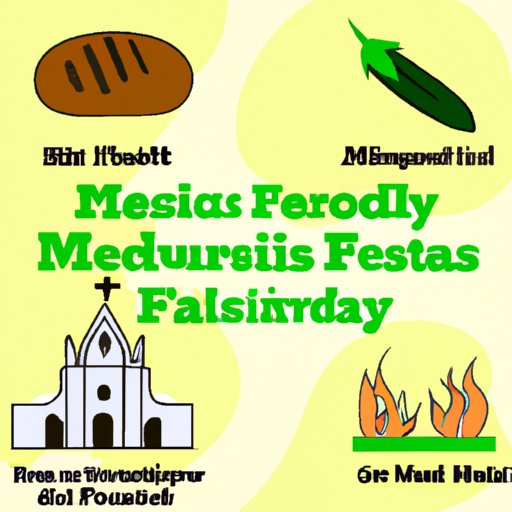I. Introduction
Have you ever wondered why Catholics don’t eat meat on Fridays? It’s a question that often perplexes people outside the Catholic faith, and sometimes even those within it. This article aims to explore and explain the practice of abstaining from meat on Fridays, its history and reasoning, and practical tips for how to observe it.
II. The Origins and History of Abstaining from Meat on Fridays
The tradition of abstaining from meat on Fridays has its roots in the early Christian Church, which saw it as an act of penance and solidarity with Christ’s sacrifice on Good Friday. Later, it became an official requirement for Catholic observance, and was accompanied by other practices of fasting and self-denial during the liturgical season of Lent.
Over time, the practice has undergone various changes and adaptations, including modifications made during Vatican II which loosened the requirements and allowed for more personal discernment. Even so, the basic tenet of abstaining from meat has remained a constant element of Catholic tradition.
III. Varied Interpretations and Cultural Expressions of the Meatless Friday Custom
While the practice of abstaining from meat on Fridays may be universal in the Catholic Church, its cultural expressions and interpretations are diverse and varied. In some countries like Ireland or Italy, it is seen as a festive occasion with seafood dishes and celebrations. In others, like the Philippines or Mexico, it is linked to the practice of fasting and reflection.
Catholics today have the freedom to observe the custom in a way that reflects their local culture and context, while still maintaining the fundamental aspect of sacrifice and penance.
IV. Traditional Abstaining from Meat vs. Modern Health and Dietary Concerns
In today’s world, where a lot of meat is factory-farmed and processed, there are concerns about the impact of meat consumption on the environment, public health, and animal welfare. For some Catholics, these concerns may raise questions about the appropriateness and relevance of the traditional practice of abstaining from meat.
However, it is worth noting that abstention from meat is not necessarily synonymous with a healthy or environmentally-friendly diet. Rather, the practice is primarily meant to signify a spiritual discipline and a willingness to participate in Christ’s sacrifice. Catholics should feel free to adapt and supplement the practice as needed to accommodate their own dietary needs and health concerns.
V. Theological and Spiritual Rationales for Fridays and Dietary Restrictions
At the heart of the Catholic practice of abstaining from meat on Fridays is a set of theological and spiritual rationales related to sacrifice, penance, and spiritual discipline. By voluntarily giving up something as basic as meat, Catholics are reminded of the importance of humility, self-control, and detachment from worldly pleasures.
These rationales also shed light on why the Church emphasizes certain dietary restrictions and guidelines for its members. Through fasting, abstention, and other practices of self-denial, Catholics are encouraged to cultivate a deeper sense of gratitude, generosity, and compassion towards others.
VI. Practical Tips, Recipes, and Ethical Considerations
For those seeking to observe meatless Fridays in a meaningful and sustainable way, there are many practical tips and resources available. A variety of meatless recipes and meal ideas can be found online or in cookbooks, and many restaurants now offer vegetarian or seafood options on Fridays.
It is also important to consider ethical considerations related to the sourcing and consumption of food in general. Catholics are called to be mindful of issues such as food waste, labor rights, animal welfare, and environmental sustainability.
VII. Social and Political Dimensions of Meat-Eating and Vegetarianism from a Catholic Perspective
While the Catholic Church does not require its members to be vegetarian or to abstain from meat entirely, it does encourage them to think critically about the social and political dimensions of their dietary choices. From issues of global hunger to climate change to animal rights, the food we eat has implications far beyond our own individual health and enjoyment.
Catholics are called to consider how their food choices reflect their values of solidarity, compassion, and justice, and to advocate for policies and practices that promote the common good of all.
VIII. Non-Observance of the Meatless Fridays in the Modern Catholic Church
In recent years, the Catholic Church has loosened its requirements around abstaining from meat on Fridays, allowing for greater personal discretion and discernment. However, some argue that this has led to a decline in the practice of meatless Fridays among Catholics, and a loss of the spiritual benefits that come with such practices.
While it is ultimately up to individuals to decide whether or not to observe the tradition of meatless Fridays, Catholics are encouraged to approach the practice with intention and prayerful discernment, rather than dismissing it altogether.
IX. Conclusion
Abstaining from meat on Fridays may seem like a small and insignificant practice, but it can have profound spiritual, social, and ethical implications. By engaging with this tradition in a thoughtful and intentional way, Catholics can deepen their relationship with God and with each other, and contribute to the well-being of the wider world.
Whether it involves refraining from meat, exploring vegetarian cuisine, or advocating for sustainable food policies, the practice of meatless Fridays can serve as a meaningful and transformative aspect of Catholic faith and life.
